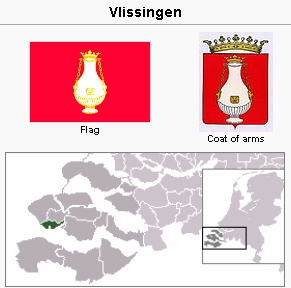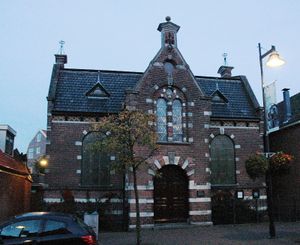Vlissingen (Zeeland, Netherlands)

Vlissingen, a seaport on the island of Walcheren (coordinates: 51° 27′ 0″ N, 3° 35′ 0″ E) in the Dutch province of Zeeland (1955 population, 26,000; 200 Mennonites; 2007 population, 45,015). Anabaptism seems to have arisen here somewhat later than in the other towns of Walcheren like Middelburg and Veere; not until 1567 is there information about it. In 1567 Hendrick Alewijnsz of Vlissingen traveled about preaching; arrested in 1568, he died as a martyr at Middelburg in 1569. He also preached in the neighborhood of Vlissingen. That there was then a congregation at Vlissingen may be concluded from a letter written by the martyr Hans Marijnsz van Oosten of Vlissingen, who was executed with Hendrik Alewijnsz in 1569. On the same day another martyr, Gerrit Duynherder, probably also from Vlissingen, was put to death. Dirk Meeuwesz of Vlissingen was apprehended in 1570 and burned at the stake there in 1571. He is the only martyr who died in Vlissingen. From ca. 1575 Mennonites of Flanders, Belgium, came to Vlissingen, where it was safer, for baptism. One of the elders from Flanders who performed baptisms at Vlissingen was Hans Busschaert, ca. 1587. About this time or shortly before, the congregation was greatly increased by the arrival of Mennonite refugees from Flanders. Thus the congregation was mostly of Flemish descent, and consequently sided with the Flemish branch. According to Faukelius there was ca. 1600 also a congregation of the Naeldemansvolk, of which Cornelis (de) Compas(maker) was the leader; they were also called "Compasmennisten." This account obviously refers to a Waterlander congregation at Vlissingen, concerning which there is no further information.
The Flemish church was always small (exact figures before ca. 1638 not available); in the 17th century the following families, all descendants of refugees from Flanders, are found among the members: van Daelle (Dale), Fa(c)k, Geleynsz, van Houteryve (Outrijve), Ta(c)k, and Willeboorts. Besides the Waterlander and Flemish congregations in the early 17th century there was at Vlissingen also an Old Flemish congregation which in 1602 separated from the Flemish church; it is also called the Huiskopers or Voetwasschers church. This small group disappeared shortly after 1640, probably by merging with the Flemish.
About 1620 the number of Mennonites at Vlissingen can be estimated at ca. 400. They seem not to have encountered special difficulties from the Reformed magistrates: in 1589 an agreement was made to exempt the Mennonites from military service upon payment of a certain sum by the congregation. During the 17th century Mennonites had to have their marriages performed by the city officials after announcement in the Reformed church, but from 1638 their marriages could be performed in their own meetinghouse. The Mennonites of Vlissingen could meet rather freely. At first meetings were held in private homes; when the membership increased in the early 17th century a house near the Reformed church was used as a meetinghouse. In 1641 a house on the Peperdijk was remodeled into a church (the "new church" mentioned in 1668 probably refers to some alteration of the Peperdijk meetinghouse). This meetinghouse was very plain, with backless benches and without a pulpit. It was remodeled in 1723, 1744, 1848, and 1859. In 1744 it obtained a pulpit; in 1848 a parlor organ. In 1859 the pulpit was replaced by a simple platform. This meetinghouse was used until 1889.
In 1632 the preacher Oillaert Willeboorts and the deacons Per Jacob Pennen (the name obviously mutilated) and Lieven Marijnsz signed the Dordrecht Confession for Vlissingen. During the Lammerenkrijgh after the Lamist-Zonist schism Vlissingen, influenced by its elder Pieter Baert, sided with the progressive Lamists.
The congregation of Vlissingen like that of Middeiburg has an important and considerable archives, now found in the Provincial Zeeland Archives at Middeiburg. Records of members and other Vlissingen church books are preserved since 1665. The congregation contributed liberally to the Committee for Foreign Needs and to other needs also of non-Mennonites.
There is a complete list of ministers since 1628. Until 1689 they served without remuneration; in this year it was decided to pay the preacher a salary of 300 Dutch guilders, soon considerably raised. The list of ministers reads as follows: Oillaert Willeboorts 1628-after 1648, Gillis Anthonissen Timmermans 1638, Cornelis Remeusz Elinck 1642, Joost van Outrijve 1649-1672, Frans Claesz 1649, Frans Cornelisz 1650, Adriaen van Nispen 1650, Antheunis de Niel 1659, Pieter Baert 1659- after 1673, Jan Pietersz van Nes 1660, Pieter de Jager 1663-1671, Maurits Arents 1663, Frans Theunissen Hugemans 1667, Leendert Lievens 1670, Jan Samuelsz Tack 1673-d.1697, Lieven van Outrijve 1675-d.1682, Anthony van Stein 1676, Christiaen van Nispen 1683, Joost van Outrijve 1686-1693, Paulus de Wind 1691, Joannes Nettis 1700, Jan van de Voorde 1701, Gerbrand Voor(e)n 1701-ca. 1725, Abbe Cornelisz Oosterling 1704, Jan Cornelisz Wit 1718, Gerardus Pauli 1722, Frederik Jaarsma 1726-1750, Jacobus Hesseling 1750-1753, Joannes Cuperus 1753-1758, Gerlof Rekker 1759-1809.
After the death of Rekker (1809) the membership being rather small and finances insufficient, the congregation of Vlissingen was served by the ministers of Middelburg until 1871. In this year Vlissingen again had a pastor of its own, H. D. Tjeenk Willink, serving 1871-73, followed by A. Snellen 1874-1878 and J. Dyserinck 1879-1884; when Dyserinck left a union was again made with Middelburg, whose pastor served until 1899; then a union was made with Goes, which lasted until 1919, pastor T. H. Siemelink, who served in the combination Goes-Vlissingen 1908-1919, from 1919 serving only at Vlissingen until he retired in 1927. He was followed by O. L. van der Veen 1929-31, Miss A. J. van den Ban 1932-39, and Miss M. de Boer since 1939.
The baptized membership was about 165 in 1665 and ca. 285 in 1673. From then it decreased, many Mennonites moving to Middelburg and Amsterdam. In 1730 the baptized membership stood at 125, in 1757 at 99, in 1773 at 74, in 1834 at 22, and in 1838 at only 18. From then there was a considerable increase: 32 in 1861, 49 in 1888, 98 in 1901, 115 in 1926, and 183 in 1958.
The old meetinghouse of 1641 on the Peperdijk was sold in 1889 to a Reformed group: a new church was dedicated on 6 July 1890, by Pastor Tj. Kielstra of Middelburg. This church, furnished with a new organ in 1908, was destroyed during World War II on 24 April 1942. On 20 February 1949, a new meetinghouse on Vrijdomsweg 1 (architect P. Feenstra) was dedicated by Miss de Boer, pastor of the congregation. Church activities in 1958 included a ladies' circle, youth groups, Sunday school for children.
Bibliography
Allgemeine Doopsgesinte Weekblad XI (1956-57): No. 51.
Cuperns J. and J. de Loos, "History of the Congregation." Manuscript in the Archives of the congregation.
Doopsgezinde Bijdragen (1861): 176; (1872): 196; (1877): 5; (1883): 101 f.; (1884): 111 f.; (1885): 131 f.; (1890): 143; (1899): 212; (1907): 168.
Doopsgezind Jaarboekje (1837): 6; (1850): 43; (1950): 33-38.
Hoop Scheffer, Jacob Gijsbert de. Inventaris der Archiefstukken berustende bij de Vereenigde Doopsgezinde Gemeente to Amsterdam 2 vols. Amsterdam: Uitgegeven en ten geschenke aangeboden door den Kerkeraad dier Gemeente, 1883-1884: v. I. Nos. 559, 580 f., 1167, 1996; v. II, Nos. 1266, 1270 f. 2340 f.; v. II, 2, Nos. 499-642. 405 f.
Braght, Thieleman J. van. Het Bloedigh Tooneel of Martelaers Spiegel der Doopsgesinde of Weereloose Christenen, Die om 't getuygenis van Jesus haren Salighmaker geleden hebben ende gedood zijn van Christi tijd of tot desen tijd toe. Den Tweeden Druk. Amsterdam: Hieronymus Sweerts, …, 1685: Part II, 757 f.
Braght, Thieleman J. van. The Bloody Theatre or Martyrs' Mirror of the Defenseless Christians Who Baptized Only upon Confession of Faith and Who Suffered and Died for the Testimony of Jesus Their Saviour . . . to the Year A.D. 1660. Scottdale, PA: Herald Press, 1951.
Pekelharing, K. R. "Bijdragen voor de Geschiedenis der Hervorming in Zeeland 1524-72." Archief VI of the Zecuwsch Genootschap van Weteuschappen. Middelburg, 1866: 293 f., 296 f., 303, 305, 306.
Winkelman. H. P. “De Doopsgezinde Gemeente te Vlissingen.” Doopsgezinde Bijdragen (1875): 32-42.
Maps
| Author(s) | Nanne van der Zijpp |
|---|---|
| Date Published | 1959 |
Cite This Article
MLA style
Zijpp, Nanne van der. "Vlissingen (Zeeland, Netherlands)." Global Anabaptist Mennonite Encyclopedia Online. 1959. Web. 19 Jan 2026. https://gameo.org/index.php?title=Vlissingen_(Zeeland,_Netherlands)&oldid=126065.
APA style
Zijpp, Nanne van der. (1959). Vlissingen (Zeeland, Netherlands). Global Anabaptist Mennonite Encyclopedia Online. Retrieved 19 January 2026, from https://gameo.org/index.php?title=Vlissingen_(Zeeland,_Netherlands)&oldid=126065.
Adapted by permission of Herald Press, Harrisonburg, Virginia, from Mennonite Encyclopedia, Vol. 4, pp. 838-840. All rights reserved.
©1996-2026 by the Global Anabaptist Mennonite Encyclopedia Online. All rights reserved.

